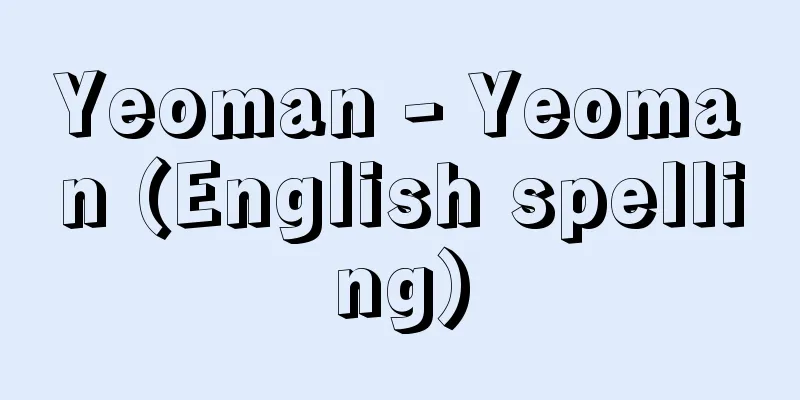Yeoman - Yeoman (English spelling)

|
A middle-class peasant in England, usually translated as "independent self-employed farmer." The word is said to be a contraction of "young man." In the 14th and 15th centuries, it referred to freeholders who had an annual income of 40 shillings or more. They were given the right to elect assembly members in their counties, participated in local administration as jurors, and were praised as the elite of the British army in the Hundred Years' War. This class was joined by copyholders and some leaseholders, who rose in rank with the dissolution of the feudal economy that was underway at the time, and the term yeoman came to refer to a broad range of farmers between the gentry and small farmers, and by the mid-15th century they owned about one-fifth of the land in England and Wales. During the absolutist era after the Tudor dynasty, some distinguished themselves in agricultural management and woolen manufacturing management, while many were forced to leave their villages because their land was taken away due to the advancement of enclosures, and the yeoman class was divided into two extremes. In particular, the decline of the freehold farmers, who were the core of the yeoman class, was further accelerated with the strengthening of the oligarchy of large landowners in the 18th century, and with the establishment of capitalist agriculture in the 19th century the yeoman class essentially disappeared. [Hiroshi Imai] Source: Shogakukan Encyclopedia Nipponica About Encyclopedia Nipponica Information | Legend |
|
通常、「独立自営農民」と訳される、イギリスの中産農民。語源は、「若者」young manが縮まったものといわれる。14~15世紀には年収40シリング以上を有する自由土地保有農(フリーホルダー)をさした。彼らは州における議員選出権を与えられ、陪審員として地方行政に携わり、また百年戦争におけるイギリス軍の精鋭とたたえられた。この階層に、当時進行中であった封建制経済の解体に伴って上昇した謄本土地保有農(コピーホルダー)と一部の定期借地農(リースホルダー)が加わり、ヨーマンはジェントリと零細農の中間を占める広範な農民層をさすようになり、15世紀中葉にはイングランド、ウェールズの土地の約5分の1を保有した。チューダー朝以降の絶対主義時代には、農業経営や毛織物マニュファクチュア経営で頭角を現す者が出る一方、エンクロージャー(囲い込み)の進展により土地を奪われて離村を余儀なくされる者も多く、ヨーマン階層には両極分解がみられた。ことにヨーマンの中核であった自由土地保有農の没落は、18世紀における大地主の寡頭支配の強化とともにいっそう促進され、19世紀の資本制農業の確立によってヨーマンは実質的に消滅した。 [今井 宏] 出典 小学館 日本大百科全書(ニッポニカ)日本大百科全書(ニッポニカ)について 情報 | 凡例 |
>>: Vaccination - prophylactic inoculation
Recommend
Matsunaga Sekigo
A Confucian scholar in the early Edo period. His ...
Nutritional requirements - eiyoushoyoryo
The amount of energy and nutrients that is desirab...
Reticulocyte - Reticulocyte
They are also called reticulocytes. When supravita...
Kasa-Nukedo Mountain Range - Kasa-Nukedo Mountain Range
...To the north of this confluence are the flat s...
Kawagoe prefecture
…His adopted son, Matsui (Matsudaira) Yasunori, i...
Housework subjects - Kajikamoku
...One tradition of home economics, which focuses...
Namboodiripad
Indian communist and politician. He began by joini...
Felis lynx canadensis (English spelling) Felislynxcanadensis
…[Yoshinori Imaizumi]. … *Some of the terminology...
National Union for the Total Independence of Angola
... During the Portuguese Salazar regime (1932-68...
Monday sickness
…Prevention can be achieved by constantly keeping...
Laboratoire maritime de Roscoff (English) Laboratoire maritime de Roscoff
...a laboratory established on the coast mainly f...
Currency Law - Kaheiho
This law was promulgated in March 1897 (Meiji 30)...
Six Jizo
[1][1] Buddhist term. Six types of Jizo Bodhisattv...
neighbouring rights
...The rights granted to performers, phonogram pr...
Phoneme Theory - Onsoron
〘noun〙 (translation of phonemics) A phonology that...

![Aleut [Archipelago] - Aleut](/upload/images/67cadfd1cc145.webp)







